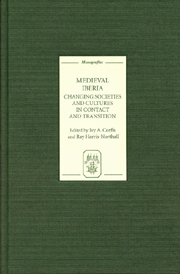Book contents
- Frontmatter
- Contents
- Acknowledgements
- Introduction
- Part 1 SOCIAL AND CULTURAL MINORITIES IN CHANGING SOCIETIES
- Part 2 CONTACT AND CONFLICT: PERSPECTIVES ON HISTORY AND CULTURE
- Part 3 TRANSMISSION OF LEARNING AND TEXTS IN CHANGING CULTURES
- Hermes Trismegistus in General Estoria II
- Pharmaceutical Fictions: Celestina's Laboratory and the Sixteenth-Century Medical Imaginary
- Spanish and Portuguese Scholars at the University of Paris in the Fourteenth and Fifteenth Centuries: The Exchange of Ideas and Texts
- The Primary Audience and Contexts of Reception of Thirteenth-Century Castilian cuaderna vía Poetry
- Editorial Interference in Amadís de Gaula and Sergas de Esplandián
- Part 4 LINGUISTIC CONTACT AND CHANGE
- Index
Hermes Trismegistus in General Estoria II
from Part 3 - TRANSMISSION OF LEARNING AND TEXTS IN CHANGING CULTURES
Published online by Cambridge University Press: 12 September 2012
- Frontmatter
- Contents
- Acknowledgements
- Introduction
- Part 1 SOCIAL AND CULTURAL MINORITIES IN CHANGING SOCIETIES
- Part 2 CONTACT AND CONFLICT: PERSPECTIVES ON HISTORY AND CULTURE
- Part 3 TRANSMISSION OF LEARNING AND TEXTS IN CHANGING CULTURES
- Hermes Trismegistus in General Estoria II
- Pharmaceutical Fictions: Celestina's Laboratory and the Sixteenth-Century Medical Imaginary
- Spanish and Portuguese Scholars at the University of Paris in the Fourteenth and Fifteenth Centuries: The Exchange of Ideas and Texts
- The Primary Audience and Contexts of Reception of Thirteenth-Century Castilian cuaderna vía Poetry
- Editorial Interference in Amadís de Gaula and Sergas de Esplandián
- Part 4 LINGUISTIC CONTACT AND CHANGE
- Index
Summary
In Part II of Alfonso el Sabio's General Estoria (henceforth GE) there is a notable sequence of chapters dedicated to the great ‘father of philosophers’, Hermes Trismegistus (1:34–9). The main significance of this narrative lies in the fact that elsewhere in this chronicle Alfonso and his collaborators display a strong interest in Hermetic philosophy; in the early portions of Part I in particular there are passages in which Hermetic ideas seem to provide a sort of theological background to the story at hand. One could say that the episode in Part II seems to say openly what is implied earlier in GE. Hermeticism is, so to speak, put on full view (Fraker 171–221). In this study I will not review in general the question of Hermeticism in Alfonso, but I do believe it worthwhile to return to the Hermes narrative itself. We will look at the layout of the narrative in some detail and will explore the episode's literary background.
I will begin with a summary of these five chapters and discuss some of the difficulties they pose. It is not an easy passage to study. The auctoritates it is based on are sometimes hard to identify, and what is more, they seem to be badly coordinated; witness the obscurities and plain contradictions that confront us here. One anomaly appears immediately. The heading to chapter 18: ‘Del philosopho Tat, que ouo nombre Hermes, e fue fijo del otro Hermes Trimegisto, e fue Mercurio’ (l:34).
- Type
- Chapter
- Information
- Medieval IberiaChanging Societies and Cultures in Contact and Transition, pp. 87 - 98Publisher: Boydell & BrewerPrint publication year: 2007



